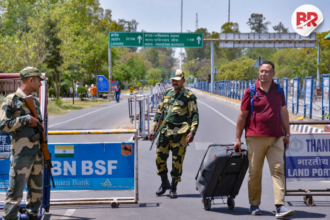
As the world faces the growing effects of climate change, there are concerns that climate action is being pushed aside in favor of strengthening military forces. In Europe, defense budgets are increasing, and the US is pulling back from its green commitments. But experts agree that climate change presents serious security threats, and military forces must prepare for these challenges.
“You can’t ignore this,” said Erin Sikorsky, who leads the Center for Climate & Security in Washington. “Climate change is happening, and armies need to be ready.”

In the United States, climate change has been downplayed, especially during President Trump’s administration. Recent security reports have failed to mention it, leaving the country vulnerable, particularly in relation to China’s growing renewable energy power and the opening of new shipping routes in the Arctic due to melting ice.
In Europe, Russia’s invasion of Ukraine has raised concerns about energy security, leading many countries to boost their renewable energy efforts. However, as governments shift focus toward defense and trade, climate budgets are being slashed. Germany, for example, plans a huge spending boost for both military and climate initiatives, emphasizing that climate action remains a top priority for national security.
“Anyone thinking about security needs to think about climate,” said Germany’s foreign and defense ministries in a recent report. They highlighted the risks of climate change, such as crop failures, conflict, and instability.
In the UK, the Ministry of Defense warned that human impact on the environment is causing pressures that could threaten entire countries. Military forces are increasingly called upon to respond to natural disasters like floods, storms, and wildfires, stretching their resources. Since 2022, over 500 military responses to climate-related disasters have been tracked worldwide.
Sometimes, climate disasters are even used as a tool for disinformation. For example, after storms in Poland, Russian disinformation targeted relief efforts. A similar situation occurred in Spain after deadly floods, with China using the same tactics.
Warming temperatures also affect military operations. Extreme heat can harm soldiers and limit the amount of cargo that military planes can carry.
Although militaries don’t have to report their greenhouse gas emissions, a 2024 report estimated that global military emissions could be responsible for 5.5% of global pollution. The Pentagon alone produces more emissions than some countries.
Militaries have long been concerned about their dependence on fossil fuels, dating back to the 1970s oil crisis. During the Gulf War, the US army used about four gallons of fuel per soldier per day, and by 2006, that number had grown to 16 gallons. This heavy reliance on fuel creates risks, as fuel convoys can be targeted by roadside bombs, which caused many American deaths in Iraq and Afghanistan.
Renewable energy could reduce these risks, but it’s not yet fully suitable for combat situations. Experts agree that militaries must adapt quickly to the changing world, with a faster shift to renewable energy to prevent climate disaster.
“No matter what, armies will have to operate in a world very different from today,” said Duncan Depledge, a climate expert.












